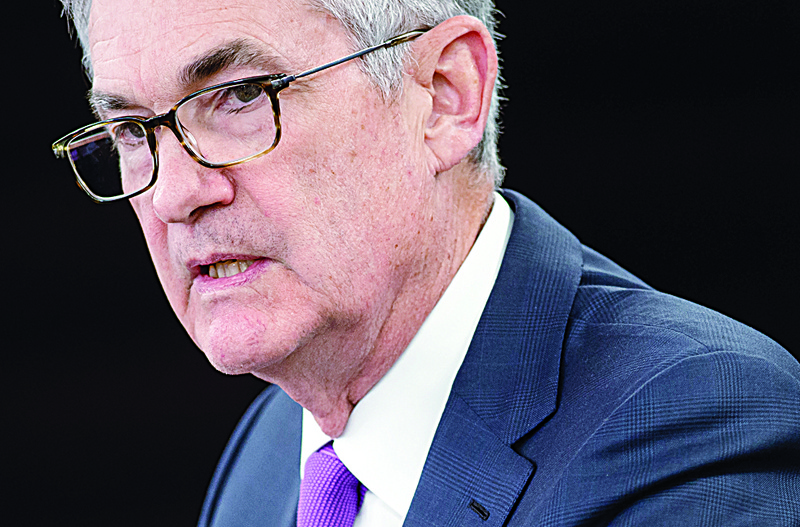 WASHINGTON: Federal Reserve Board Chairman Jerome Powell arrives to speak at a press conference in this file photo. President Joe Biden has nominated Powell for a second term as Federal Reserve Chair yesterday.- AFP
WASHINGTON: Federal Reserve Board Chairman Jerome Powell arrives to speak at a press conference in this file photo. President Joe Biden has nominated Powell for a second term as Federal Reserve Chair yesterday.- AFP
WASHINGTON: A wealthy Republican with no formal economics training, Jerome Powell yesterday nonetheless won support from Democratic President Joe Biden to lead the Federal Reserve for a second term. The 68-year-old former investment banker has shown skill in navigating Washington's political quagmire, receiving praise and criticism from all sides while maintaining the central bank's independence.
If confirmed by the US Senate, Powell will continue to lead the Federal Reserve for another four years, charged with guiding the world's largest economy through its recovery from the pandemic, while ensuring jobs are restored without further inflaming inflation. In re-nominating Powell, Biden dismissed calls from progressive Democrats to replace him with a more liberal choice. "We can't just return to where we were before the pandemic, we need to build our economy back better," the president said in a statement. "I'm confident that Chair Powell and (vice chair nominee Lael) Brainard's focus on keeping inflation low, prices stable and delivering full employment will make our economy stronger than ever before."
Powell first took the helm of the US central bank in 2018 after he was tapped by then-president Donald Trump to replace Janet Yellen. He then withstood months of withering attacks from Trump for raising interest rates. Powell has since won plaudits for his focus on ensuring the benefits of economic growth reach the most marginalized Americans, and for leading a shift in Fed policy to achieve that. But liberals have attacked him for not doing more to rein in banks and to contribute to the fight against climate change.
Building consensus
During his term, Powell, who prefers to be called "Jay," managed to unite the inflation hawks and doves on the Fed's policy-setting committee. He presided over four interest rate increases by the Federal Open Markets Committee in his first year, ignoring public criticism from Trump, who accused him of harming the economy. When the COVID-19 pandemic landed on American shores in early 2020, Powell and the Fed wasted no time. The bank slashed its benchmark rate to zero by mid-March, and rolled out new lending facilities and a massive bond buying program to ensure the US financial system would not seize up, as it did in 2008.
Those efforts, together with trillions of dollars in federal stimulus spending, were largely successful in preventing a more severe, long-lasting downturn. The unemployment rate shot up to 14.8 percent in April 2020 but had declined to 4.6 percent last month, though that was still more than a percentage point above where it was before the pandemic. Powell is now being accused by some politicians and economists of letting the economy run too hot as labor shortages and global shipping and supply bottlenecks push inflation higher. After languishing for years below the Fed's two-percent target, the consumer price index jumped to 6.2 percent in October, the highest in more than three decades.
The Fed this month started to slow its stimulus to the economy, reducing its monthly bond purchases. But Powell has said the price spike is driven by temporary factors and the Fed will not raise interest rates until it has ended the bond-buying program, likely around the middle of the year. Even some liberal economists think it is time for the Fed to change its message and prepare markets for one or as many as three rate hikes next year.
Gradual tightening
While the United States has seen strong jobs gains, unemployment for African Americans was at 8.8 percent in August, and 6.4 percent for Hispanics-a fact Powell never fails to mention in his public appearances. He stresses the importance of keeping economic growth going for as long as possible to ensure gains are shared widely, and in a break from the aloofness often seen among Fed chairs, has sought out the views of workers and small businesses nationwide.
Prior to his appointment to the central bank in 2012 by then-president Barack Obama, Powell was a scholar at the Bipartisan Policy Center think tank. The native of Washington served as assistant secretary of the Treasury in charge of financial institutions for a brief period under President George H.W. Bush starting in 1992. An attorney rather than an economist, Powell is among the wealthiest people ever to lead the Fed.
He disclosed a net worth earlier this year of between $20 million and $55 million after nearly a decade as a partner at the Washington-based private equity giant Carlyle Group. Powell was not immune from the controversy over stock market activity by Fed officials, after disclosure forms showed he took $1 million to $5 million out of an investment fund last year. - AFP
.jpg)



